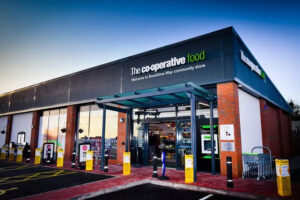How Mars and Walmart illustrate the future of sustainability
Sustainability carries a lot of buzz these days, whether you’re talking about choices in food, business plans or personal lifestyles. But when Mars Inc. uncovered a troubling flaw in its supply chain, sustainability became an imperative for the brand.
In September, the global food manufacturer overhauled its business operations, vowing to reduce its greenhouse gas emissions and improve employee working conditions. CEO Grant F. Reid said he anticipates a long, bright future for his company, but only if it puts sustainability at the core of its business ethos.
“The only way that will happen is if we do things differently to ensure that the planet is healthy and all people in our extended supply chains have the opportunity to thrive,” he said.
As Reid and other CEOs are learning, sustainability isn’t just a “nice-to-have,” especially from a consumer perspective. A recent study indicates that one-third of consumers prefer to buy from brands with reputations for sustainability, so it no longer matters whether your business deals directly with environmental issues: Business leaders must use enlightened self-interest to educate themselves and their teams on sustainability’s benefits in order to implement and scale environmentally sound initiatives.
What, exactly, is enlightened self-interest? To me, it’s where your professional and personal goals intersect. Before you successfully can incorporate sustainability into your organization, you need to invest in the concept emotionally. I’m not here to make the virtuous case for sustainability. Moves toward eco-friendly manufacturing and socially conscious business management are ethical; it’s true. But they also help nurture a healthy bottom line.
Just as important are customers becoming more empowered and eco-conscious. Millennials, especially, do incessant research to assure the products they buy are produced ethically and align with their values. A Nielsen study noted that 55 percent of millennials surveyed say they’d pay more for products sold by socially responsible companies.
Enlightened self-interest can create positive ripples throughout your supply chain. When multiple retailers, manufacturers and suppliers depend on you for customer engagement and distribution, you wield considerable influence that can be used for the greater good.
Consider Walmart, a top-tier global brand that works with 150,000 suppliers. When Walmart set its sights on adopting more sustainable practices, it insisted that suppliers begin using 100-percent recyclable packaging materials and more efficient packaging methods that would reduce the fuel needed to transport products. More efficient packaging also meant more products with which to stock Walmart’s shelves and create more profit opportunities — that’s enlightened
The shift toward environmentally sound policies heartened customers, inspired pride in employees and reduced the waste produced by Walmart and its affiliates. It also won over skeptics, such as Pearl Jam guitarist Stone Gossard. Gossard is a well-known environmentalist who didn’t believe me when I told him Walmart was insisting that all CDs sold in its stores be packaged in cornstarch-based wrapping instead of plastic. But he called me one day after hearing that record companies were, in fact, making the shift, and he was delighted to acknowledge Walmart’s new green CD policy.
Profits and ethics are not at odds — at least, they don’t have to be. When you cultivate a mindset of enlightened self-interest, you can help your company thrive while also helping people. And isn’t that the holy grail?
I enjoy sharing the Walmart story because it’s a powerful example of how enlightened self-interest drives change. But it also illustrates another important point, which is that to really move the needle, sustainability must be in a company’s DNA.
Had Walmart merely paid lip service to sustainability or continued to work with suppliers that eschewed eco-friendly practices, it wouldn’t have made much of an impact and might have cost the retailer credibility with environmentally conscious consumers. Instead, it made sustainability a core policy and flourished because of it.
It’s not the only company benefiting from a sustainability-driven philosophy. Disney, one of the most beloved brands on the planet, has been eco- and conservation-conscious since its founding. It operates a state-of-the-art energy management system that saves the brand considerably on energy usage across its many attractions and properties.
Coca-Cola also has a keen interest in environmental operations. As a company that relies on water to produce its marquee products, Coca-Cola invests heavily in water conservation and efficiency, both in its factories and in parts of the world that serve as key water sources — an approach that helps Coca-Cola and is good for the environment. The company also has saved $90 billion by improving its bottle designs and decreasing packaging waste.
As these global giants prove, enlightened self-interest is a win-win. By serving as sustainability stewards, businesses can win customers, reduce costs and ensure the long-term health of their environments — for their businesses and their communities.
Source: Greenbiz




